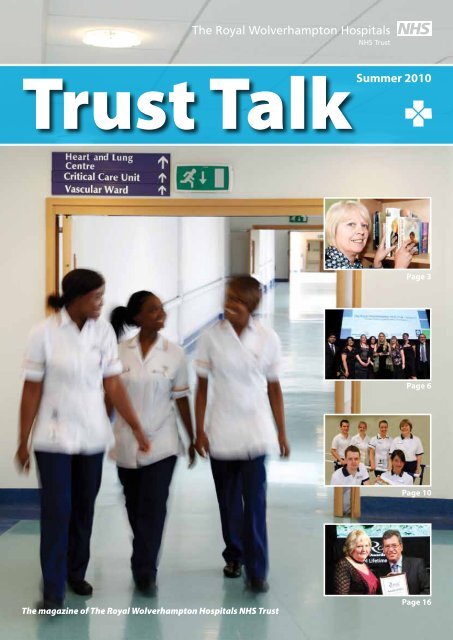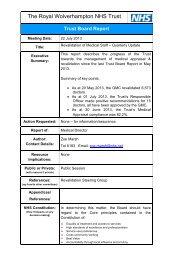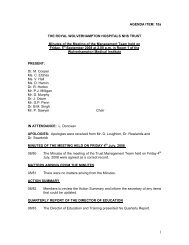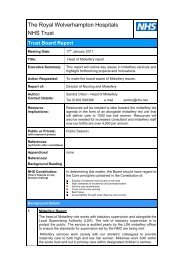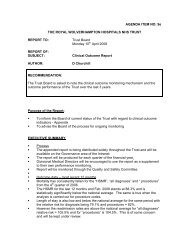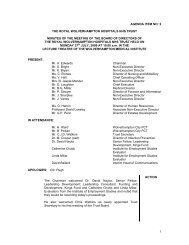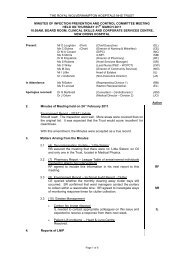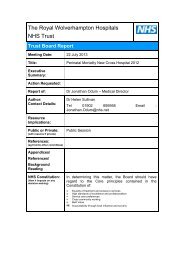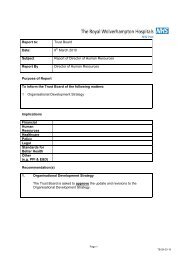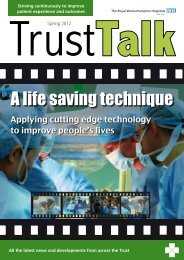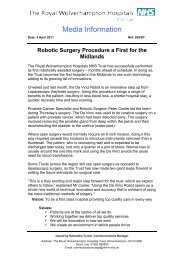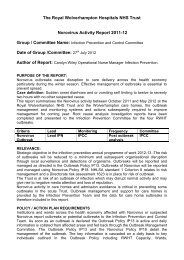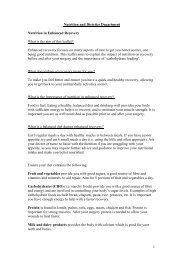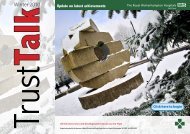page 21. - The Royal Wolverhampton Hospitals NHS Trust
page 21. - The Royal Wolverhampton Hospitals NHS Trust
page 21. - The Royal Wolverhampton Hospitals NHS Trust
You also want an ePaper? Increase the reach of your titles
YUMPU automatically turns print PDFs into web optimized ePapers that Google loves.
<strong>Trust</strong> TalkSummer<br />
2010<br />
Page 3<br />
Page 6<br />
Page 10<br />
<strong>The</strong> magazine of <strong>The</strong> <strong>Royal</strong> <strong>Wolverhampton</strong> <strong>Hospitals</strong> <strong>NHS</strong> <strong>Trust</strong><br />
Page 16
Contents<br />
Chief Executive’s Welcome <strong>page</strong> 1<br />
Welcome<br />
David Loughton CBE, Chief Executive<br />
Nurses Triumph in <strong>NHS</strong> Innovation 'Oscars' <strong>page</strong> 2<br />
Praise for our Head & Neck Cancer Service <strong>page</strong> 4<br />
Triple Excellent Rating for New Cross Hospital <strong>page</strong> 6<br />
Tackling Violence Against Hospital Staff <strong>page</strong> 8<br />
Rok On - For New kitchens <strong>page</strong> 11<br />
Chatback brings 'Fantastic' response from Staff <strong>page</strong> 12<br />
Get the low-down on the <strong>NHS</strong> Number <strong>page</strong> 14<br />
<strong>Royal</strong> Awards <strong>page</strong> 16<br />
It’s always a pleasure to read stories about New Cross staff who demonstrate their dedication and success.<br />
<strong>The</strong> range of articles in this edition of <strong>Trust</strong> Talk demonstrate the diversity of the services we offer to our<br />
patients and how our staff are always looking for ways to improve the experience for patients and of course<br />
for our staff. It is good to see staff getting recognition at a regional and national level, not only is it excellent<br />
for them on a personal level, it also gives greater confidence to those who use our services that our staff are<br />
amongst the best in the country.<br />
Going the extra mile…<br />
I would like to take this opportunity to thank you all for the continuing commitment to delivering first class<br />
services. This commitment was borne out by the number of nominations for this years <strong>Royal</strong> Awards which<br />
included a new award - the “100 Club” award. As always, the Directors took great pleasure in presenting<br />
awards to the individuals and teams that you nominated as the best.<br />
Giving us your views –<br />
Earlier this year the HR Department launched “Chatback” this<br />
interactive survey method has helped us to get real time views<br />
about what it is like to work at New Cross. You can read the<br />
overall survey results in this edition.<br />
Your line manager will be sharing the results for your directorate with you soon. Those people who took part<br />
thought it was an excellent way to survey staff. As a result we will be using this method at regular intervals<br />
throughout the year – if you didn’t get the chance to join in last time keep a look out for the next survey.<br />
ChatBack<br />
New clinics reduce length of stay <strong>page</strong> 19<br />
<strong>Trust</strong> introduces i-Bleep <strong>page</strong> 21<br />
Have you got any stories for the next edition of <strong>Trust</strong><br />
Talk? <strong>The</strong>n contact the Communications Department<br />
on 01902 695950 or email<br />
carole.regan@nhs.net<br />
If you require this magazine in another format please<br />
contact the Communications Team on:<br />
01902 695950<br />
David Loughton CBE<br />
Chief Executive<br />
1
Nurses Triumph in <strong>NHS</strong><br />
Innovation ‘Oscars’<br />
Family Says ‘Thank You’<br />
To New Cross Hospital<br />
MidTECH, the West Midlands Innovation hub, is about to<br />
launch its 2010 awards – and <strong>The</strong> <strong>Royal</strong> <strong>Wolverhampton</strong><br />
<strong>Hospitals</strong> <strong>NHS</strong> <strong>Trust</strong> will be hoping to repeat the success<br />
it had in last years competition.<br />
A team of nurses from New Cross Hospital carried off the<br />
2009 MidTECH Award for Innovation in Acute Care at an<br />
‘Oscars’ style ceremony.<br />
<strong>The</strong> team – Kerry Holt, Rachael Trevitt, Jo Thomas and<br />
Marie Ramsbottom – won the award for a paediatric<br />
triage system they have devised to assess how quickly<br />
young patients need to be seen for various different<br />
conditions.<br />
<strong>The</strong>y were presented with their trophy – and a £4,000<br />
cheque to spend on expanding their triage system – at<br />
a ceremony held at the Botanical Gardens, Birmingham,<br />
last November.<br />
Pictured receiving their Award for Innovation in Acute Care at the MidTECH<br />
awards.<br />
Volunteers polish up their<br />
Customer Care skills<br />
<strong>Trust</strong> volunteers have been busy<br />
completing their NVQ Level 2 qualifications<br />
in Customer Care Skills.<br />
<strong>The</strong> first to pass the NVQ – arranged<br />
through Dudley College – was Terry Henry,<br />
who volunteers in the Heart and Lung<br />
Centre, drives our scooter and helps out<br />
with the WRVS.<br />
As part of their duties, the volunteers are<br />
observed in action and assessed over nine<br />
months.<br />
Volunteers currently undertaking the<br />
course are Volunteer Wayfinders Barrie<br />
Rock and Andrew Clifton, Volunteer Meal<br />
Time Helper Joyce Amor-Wilkes and<br />
Volunteer Reception Helper in EAU Heike<br />
Casaul-Cuya.<br />
<strong>The</strong>y have been able to access the course<br />
through our Education and Training<br />
Department and are again taking the<br />
qualification through Dudley College. <strong>The</strong>y<br />
hope to pass later this year.<br />
Nicholas Price, Consultant Opthalmologist, and Bhogal<br />
Singh Bhogal, Optometrist, also from New Cross Hospital,<br />
were finalists in the MidTECH 2009 awards for developing<br />
a new device to help surgeons to make a highly accurate<br />
cut of the membrane surrounding the lens of the eye.<br />
MidTECH is part of a national network of <strong>NHS</strong> innovation<br />
hubs, established by the Department of Health to<br />
identify, protect and commercialise innovative ideas from<br />
the <strong>NHS</strong>.<br />
This years MidTECH awards are expected to be launched<br />
in Mid June and entries will be via the web site<br />
www.midtech.org.uk , with the closing date for entries on<br />
14 September.<br />
Once again the awards ceremony will be held at the<br />
Botanical Gardens, on Thursday 25 November, and there<br />
will be a prize fund to a total of £10,000.<br />
So, if you have an innovative project you have been<br />
working on this year, get ready to put in an entry!<br />
Andrew Clifton said: “It is good that I can<br />
do this course through my volunteering, as<br />
it boosts my confidence and gives me skills<br />
and a qualification which will be useful to<br />
me when job hunting.”<br />
<strong>The</strong> <strong>Trust</strong> is continuing to offer NVQ<br />
training for volunteers and any who are<br />
interested in taking part should contact<br />
Eleanor Britton, Volunteer Services<br />
Coordinator, in the Patient Information<br />
Centre on extension 4111.<br />
A <strong>Wolverhampton</strong> family struck by<br />
tragedy has said a big ‘thank you’ to<br />
New Cross Hospital by raising a total<br />
of around £2,500 for the Deanesly<br />
Centre.<br />
Mrs Pat Clowes, now aged 60, says<br />
the centre saved her life after she<br />
was diagnosed with ovarian cancer<br />
two and a half years ago.<br />
“Staff were so good – I couldn’t have<br />
had better treatment if I’d paid for it<br />
privately,” she said.<br />
“I am still undergoing treatment but<br />
I wouldn’t be here now without their<br />
skill and dedication.”<br />
<strong>The</strong> family and their friends had<br />
already raised around £1,000 to buy<br />
equipment for the centre when,<br />
sadly, Mrs Clowes’ 25-year-old son<br />
Andrew died in a road accident last<br />
year.<br />
Donations in his memory helped<br />
to raise a further £1,500, which Mrs<br />
Clowes presented to the centre<br />
in January. <strong>The</strong> money purchased<br />
a blood pressure machine, which<br />
bears a plaque with Andrew’s name.<br />
Book stall keeps coining it in!<br />
Irene Holden restocking the shelves after more generous donations.<br />
At the presentation of the cheque are, left to right, Ann Jenkins, David Clowes, Teresa Pedley, Gill<br />
Williams, Margaret Bayliss, Pat Clowes and Dawn Harrison<br />
A left-over box of paperback books started off a fund-raiser<br />
which has, over the last four years, brought in a grand total of<br />
more than £3,327 for cancer funds.<br />
That original box of books was put on a table in Deanesly<br />
Centre reception, with a tin and a sign saying ‘20p each, money<br />
raised to go to Deanesly Centre <strong>Trust</strong> Funds’.<br />
Patients, relatives and New Cross staff not only snapped up<br />
these bargains – but then started bringing in their own old books<br />
from home and put them on the table too.<br />
“As fast as we sold the books, they were replaced with even<br />
more and we had to find a bigger table to put them all on, said<br />
Irene Holden, Practice Manager Cancer Services.<br />
“Very often, people pay their money (often more than 20p is<br />
donated!) and when they have read the books, they bring them<br />
back and buy more, hence re-cycling them too!”<br />
All money has been paid into Deanesly Centre <strong>Trust</strong> Funds and<br />
receipts are on display for all to see.<br />
“<strong>The</strong> books have now been promoted to a lovely new bookcase<br />
and the money is still rolling in. Not a bad little venture from a<br />
box of scrap paperbacks!” said Irene.<br />
2 3
Praise for our Head and<br />
Neck Cancer Service<br />
Dawn Dawson (standing) with Dr Croline Brammer entering audit data.<br />
Cancer Services at New Cross have been<br />
congratulated for the quality of their<br />
data collection.<br />
<strong>The</strong> praise comes from the DAHNO<br />
(DAta for Head and Neck Oncology)<br />
Audit Coordinator at the Information<br />
Centre for Health and Social Care.<br />
As a result, the project is to be included<br />
as a case history in this year’s DAHNO<br />
annual report to illustrate how the trust<br />
has managed to improve data collection<br />
and quality in just one year.<br />
<strong>The</strong> DAHNO audit, commissioned<br />
and supported by the Care Quality<br />
Commission, is a national review of the<br />
care received by patients with head and<br />
neck cancer.<br />
It identifies areas of good practice, as<br />
well as gaps in provision of care, across<br />
the nation with the aim of improving<br />
patient care and outcomes.<br />
<strong>The</strong> task<br />
<strong>The</strong> treatment of head and neck cancer<br />
is complex and requires integration of<br />
the skills of many different health care<br />
professionals for the best results.<br />
<strong>The</strong> data published by DAHNO can<br />
reassure Care Quality Commission that<br />
treatment decisions at an individual unit<br />
are made within the context<br />
of a multidisciplinary team<br />
according to the Improving<br />
Outcomes Guidance.<br />
Data collected can also<br />
be used as an indicator of<br />
clinical performance to guide<br />
resource allocation.<br />
“We felt that the Head and<br />
Neck Team at New Cross was<br />
a unit to be proud of and,<br />
so that we could reflect this<br />
fact on the national stage,<br />
our contribution to the<br />
national audit needed to be<br />
as complete and accurate<br />
as possible,” said Consultant<br />
Oncologist Dr Caroline<br />
Brammer.<br />
How we did it<br />
Caroline added: “To do this, we<br />
cross-referenced clinician and<br />
trust databases not only to identify<br />
discrepancies, but also to understand why<br />
discrepancies were occurring.<br />
“We discovered that the data for patients<br />
who started their cancer journey at<br />
hospitals other than New Cross Hospital<br />
was being lost in the <strong>Trust</strong> databases due to<br />
classification errors.<br />
“For the Black Country Head and Neck Multi<br />
Disciplinary Team (MDT), this amounted to<br />
two thirds of our activity.<br />
“We also discovered the many bugs and<br />
idiosyncrasies of the <strong>Trust</strong> database (the<br />
Somerset Cancer Registry) on to which<br />
we were entering our data, learning how<br />
to operate it more efficiently as well<br />
as informing the database creators of<br />
its problems to help them with future<br />
remodelling.”<br />
For the 2008–2009 DAHNO audit most data<br />
was retrospectively added to the Somerset<br />
Cancer Registry once the patients eligible<br />
for the audit had been identified.<br />
This was time-consuming for all members<br />
of the team so, for the 2009/2010 audit, we<br />
aimed to collect data in advance to spread<br />
the load and to further improve data quality.<br />
<strong>The</strong> results<br />
Live data entry at the MDT has been<br />
introduced to facilitate accurate coding<br />
of diagnosis and the team has been<br />
restructured to help the coordinator identify<br />
where the patient is on their treatment<br />
journey.<br />
<strong>The</strong> MDT meeting discussion lists are split<br />
in to pre-diagnosis, post-diagnosis pretreatment,<br />
post-treatment and recurrent<br />
disease lists.<br />
This also helps us to meet both the 31<br />
and 62 day waiting time targets set by the<br />
government and those clinical best practice<br />
targets which have been shown to improve<br />
survival in head and neck cancer (less than<br />
42 days between surgery and postoperative<br />
radiotherapy).<br />
<strong>The</strong> new data collection and recording<br />
system is also helping with many other<br />
aspects of patients’ care.<br />
For the future<br />
To provide a better service to all patients<br />
and to help us gain a more useful picture<br />
of our performance, we plan to collect<br />
information of functional outcomes, such as<br />
quality of speech and ease of swallowing, as<br />
well as the information on recurrence and<br />
survival currently collected.<br />
All patients will be seen in a<br />
multidisciplinary clinic at defined times after<br />
treatment which is dedicated to the formal<br />
assessment of these functional outcomes<br />
and also identification of any unmet patient<br />
concerns and needs.<br />
Caroline said: “Participation in the DAHNO<br />
audit has been hard work for both clinical<br />
and non clinical members of the team but<br />
the act of data collection through the MDT<br />
itself can improve patient care by ensuring<br />
that management decisions are made by an<br />
expert multidisciplinary team and ensure<br />
that the outcomes of treatment are fully<br />
measured and understood.<br />
“By having the full perspective of<br />
treatment outcomes we can target the<br />
right treatments to the right patients more<br />
effectively and efficiently to provide the<br />
optimum result in terms of survival and<br />
quality of life. Thank you to all members of<br />
the team.”<br />
Caroline can be contacted at the<br />
Radiotherapy Offices:<br />
Extension 8304.<br />
<strong>The</strong> Head & Neck Cancer Services MDT team at New Cross who have been<br />
congratulated for the quality of their data collection.<br />
4 5
Triple Excellent Rating<br />
for New Cross Hospital<br />
New Cross Hospital has been awarded top marks for privacy<br />
and dignity, food and patient environment in a recent round of<br />
inspections.<br />
A triple ‘excellent’ rating was given following the <strong>Trust</strong>’s recent Patient<br />
Environment Action Team (PEAT) assessment.<br />
<strong>The</strong> inspections, established in 2000, check <strong>NHS</strong> hospitals and units<br />
in England with more than 10 beds and are overseen by the National<br />
Patient Safety Agency.<br />
<strong>The</strong> PEAT scores demonstrate how well individual healthcare<br />
providers believe they are performing in three key patient areas<br />
including food, infection control and patient environment - which<br />
includes cleanliness, bathroom areas, décor, lighting, floors and<br />
patient areas.<br />
Each PEAT inspection is carried out by a group which consists of<br />
patients, local people, <strong>NHS</strong> staff including nurses, matrons, doctors,<br />
catering and domestic service managers, executive and non-executive<br />
directors, dieticians and estates managers.<br />
<strong>The</strong> teams look at standards within three main categories –<br />
Lean-Thinking Leads to Award<br />
<strong>The</strong> <strong>Trust</strong> celebrated success at the National<br />
Lean Healthcare Academy awards – thanks to<br />
innovative steps to improve the handling of<br />
clinical correspondence.<br />
<strong>The</strong> Performance and Service Improvement<br />
Team, along with the Diabetes Team, won<br />
the academy’s Innovation Award 2009,<br />
recognising the introduction of a ‘digital<br />
dictation’ pilot project at the <strong>Wolverhampton</strong><br />
Diabetes Centre. Digital Dictation is a method<br />
of recording and editing the spoken word in<br />
real-time for transcription, in a digital format.<br />
<strong>The</strong> system replaces dictaphones with digital<br />
handsets and speech microphones, linked<br />
directly to computers. Dictated information<br />
is uploaded onto the network thereby<br />
removing the need for tapes. <strong>The</strong> system<br />
allows onscreen identification of individual<br />
letters, tracking of work and in depth activity<br />
reporting.<br />
<strong>The</strong> project has led to more efficient<br />
turnaround times for dealing with clinical<br />
correspondence.<br />
Before introducing digital dictation the team<br />
had missed the 72-hour target for turning<br />
around correspondence on 26 occasions.<br />
Collecting their award from left to right are Herbie Mann, Bimla Devi, Sarah Brettle,<br />
Julie White, Nina White, Lisa Harrison, Cathy Mincher.<br />
Environment, Food and Privacy and Dignity. Each site is then given a<br />
rating - ‘Excellent’, ‘Good’, ‘Acceptable’, ‘Poor’ or ‘Unacceptable’.<br />
During the inspections, <strong>Trust</strong>s endeavor to assess 25 per cent of their<br />
whole site, including external areas such as car parks and grounds.<br />
Patient comments are also sought by the PEAT<br />
assessors.<br />
Divisional Manager Graham Argent, said:<br />
“<strong>The</strong> whole of the Estates & Facilities team are<br />
really delighted to have achieved these ratings<br />
this year. It is a real demonstration of our<br />
determination to be the best.<br />
“While the scores were ‘excellent’, we recognise<br />
we are not perfect and that there is always<br />
room for improvement.<br />
“That said, to have achieved the triple<br />
‘excellent’ rating puts us firmly in the upper Graham Argent<br />
quartile of hospital performers and we are<br />
now absolutely determined to maintain this rating.”<br />
However, since its introduction in April 2009,<br />
the Diabetes Medical Secretarial Team has<br />
consistently achieved the 48-hour target.<br />
<strong>The</strong> academy event included over 100 entries<br />
from around 30 <strong>NHS</strong> organisations, including<br />
poster displays of projects and team<br />
achievements, presentations and the awards<br />
ceremony.<br />
Sarah Brettle, Medical Secretary, said: “It was<br />
a fantastic achievement by the whole team<br />
and we felt very proud that our work was<br />
recognised.”<br />
Senior Secretary Lisa Harrison said: “It was a<br />
very enjoyable night all round, made extra<br />
special by actually winning the innovation<br />
award.”<br />
Herbie Mann, IT Engineer, said: “To be<br />
declared winners of the Innovation Award is<br />
just outstanding.”<br />
And Nina White, Service Improvement<br />
Manager and Lead on Digital Dictation, said:<br />
“<strong>The</strong> achievements of the Diabetes Team,<br />
with the support of Service Improvement<br />
and IT, have demonstrated what can be<br />
achieved through team work and lean<br />
thinking.<br />
“But there is always more we can do. <strong>The</strong><br />
team are already looking to further improve<br />
the correspondence pathway.”<br />
For further information about digital<br />
dictation, contact Nina White on:<br />
Extension 4470.<br />
Putting Patients at the Heart<br />
of Cardiology Services<br />
<strong>The</strong> Cardiology Services team have made<br />
innovative steps to improve their service<br />
to patients who need swift unblocking of<br />
arteries when they arrive in hospital.<br />
Since April 2007, New Cross Hospital has<br />
offered a 24 hour, seven days per week<br />
Primary PCI (Percutaneous Coronary<br />
Intervention, or angioplasty) service to<br />
patients.<br />
<strong>The</strong>re is an interim target of 90 minutes –<br />
known as the ‘door to balloon time’ – from<br />
when a patient arrives at hospital to the time<br />
when the blocked artery is reopened within<br />
the Catheter Suite. An event took place last<br />
August, supported and facilitated by the<br />
Service Improvement Team, to look at ways<br />
of improving the service and to analyse the<br />
reasons for failing to meet this target for<br />
some patients.<br />
<strong>The</strong> event included attendance from the<br />
Ambulance Service, Black Country Cardiac<br />
Network, Cardiac Assessment Team, A&E<br />
and EAU, along with staff from the relevant<br />
departments within Cardiology Services.<br />
During the session the team examined<br />
existing ways of working and issues<br />
associated with each point of the patient<br />
journey. Reflecting on this, the team then<br />
began to identify changes that could be<br />
made to the service moving forward.<br />
Cardiology Services have taken a team<br />
approach to improving their service and the<br />
outcomes to date include:<br />
• A revised, streamlined patient pathway<br />
• A revised Primary PCI Operational<br />
Policy<br />
• Strengthened working relationships<br />
between teams, departments, and<br />
external organisations<br />
• Strengthened role of the Cardiology<br />
Coordinator and the development of<br />
a checklist to support admission of<br />
patients with suspected Primary PCI<br />
Our Alex Appointed<br />
<strong>Royal</strong> College<br />
Student Rep<br />
Midwives at New Cross are delighted that<br />
one of their midwifery students has won a<br />
national honour.<br />
Alex Birch has been elected as student<br />
representative for the <strong>Royal</strong> College of<br />
Midwives Student Midwife Working Group.<br />
Alex is one of many students at<br />
<strong>Wolverhampton</strong> who are extremely<br />
passionate about providing the best quality<br />
midwifery care.<br />
One of Alex’s particular interests lies<br />
in supporting and promoting normal<br />
childbirth.<br />
Maria Stevens presents innovative steps to improve the patient experience.<br />
Her application to become student<br />
representative was keenly supported, with<br />
recommendations by five of her colleagues<br />
and the Head of Midwifery Education at the<br />
University of <strong>Wolverhampton</strong>.<br />
<strong>The</strong> national Student Midwife group meets<br />
three times a year and its main function is<br />
raising awareness of the issues effecting<br />
student midwives in England, Wales,<br />
Scotland and Northern Ireland.<br />
Alex will be giving a presentation in London<br />
focussing on the role of midwifery students<br />
in promoting and supporting normal birth.<br />
<strong>The</strong> revised Primary PCI processes were<br />
officially launched in October, and the team<br />
will be monitoring performance following<br />
the implementation of their action plan.<br />
For further information on the Primary PCI<br />
Service; please contact Hayley Kemp, Matron<br />
- Cardiothoracic and Radiology Directorate,<br />
extension 4218. If you would like further<br />
information or support with improving<br />
services, please contact the Service<br />
Improvement Team on extension 4470 or<br />
service.improvement@rwh-tr.nhs.uk.<br />
New student representative Alex Birch<br />
6 7
Tackling Violence<br />
Against Hospital Staff<br />
Our recently appointed Local Security<br />
Management Specialist, Barry Palmer, and<br />
other security staff work closely with the<br />
police to protect staff, patients and visitors<br />
from crime.<br />
Figures released in November by <strong>NHS</strong><br />
Security Management Services (SMS) showed<br />
a fall in the number of cases of violence<br />
towards staff nationally.<br />
However, there were still 54,758 reported<br />
physical assaults against <strong>NHS</strong> staff during<br />
2008-09.<br />
While this was a reduction of 1,235 compared<br />
to the previous year, SMS says the number<br />
of assaults is a very serious matter and more<br />
needs to be done to prevent them from<br />
occurring and to take sanctions when such<br />
cases occur.<br />
Violence against <strong>NHS</strong> staff is unacceptable<br />
and staff who are committed to provide<br />
health services should not expect to have to<br />
suffer violence at work.<br />
Initiatives organised by the <strong>Trust</strong> aimed<br />
at keeping staff safe included a Security<br />
Awareness Day in November, attended by<br />
Barry Palmer, Paul Smith, the <strong>Trust</strong>’s Safety<br />
Trainer for Conflict Resolution and local<br />
police.<br />
In memory of Beryl<br />
<strong>The</strong> family and friends of a patient in the<br />
former Lung Function Department – now<br />
called the Respiratory Centre – donated £994<br />
as a thank you for her treatment.<br />
Mrs Beryl Taylor, who used to enjoy going<br />
dancing with her husband and friends,<br />
required oxygen therapy for her lung<br />
condition.<br />
Family and friends gave money in her<br />
memory, which has been used to purchase a<br />
mouth pressure meter and a pulse oximeter.<br />
A donation was also made towards the <strong>Trust</strong>’s<br />
‘Oxygen Alert’ key fob and information cards.<br />
This new innovation has led to oxygen<br />
patients being issued with a key fob and<br />
information card that will bring to the<br />
attention of any healthcare professional the<br />
fact that the patient is sensitive to oxygen<br />
therapy and retains carbon dioxide.<br />
<strong>The</strong> aim was to raise awareness of security<br />
issues that could affect staff inside and<br />
outside the hospital, including personal<br />
safety and reporting of violence or incidents<br />
of aggression.<br />
Over 250 staff attended the event and<br />
completed security questionnaires.<br />
Inspector Bryan Jones, of <strong>Wolverhampton</strong><br />
Police, who also attended, said: “Crime<br />
rates across the hospital are low due<br />
to the investment by the <strong>Trust</strong> in its<br />
security.<br />
“<strong>The</strong> only real issue of concern<br />
is the very small number of<br />
visitors that are violent<br />
and aggressive<br />
towards staff,<br />
patients and other<br />
visitors to the<br />
hospital.<br />
“We would like to get<br />
the message across that<br />
this behaviour will not be<br />
tolerated.<br />
“Anyone found behaving in this way will be<br />
arrested and will face prosecution.”<br />
Gary Penn, Director of Estates Development<br />
for the <strong>Trust</strong>, added: “We will continue to<br />
This will prevent them from being<br />
administered too much oxygen.<br />
In addition, the alert is put on to the hospital<br />
patient information system so that this<br />
information is passed to the Accident &<br />
Emergency Department.<br />
Rosemary Steel, Specialist Respiratory<br />
Physiologist and Oxygen Lead at the<br />
Respiratory Centre, said: “We have links with<br />
West Midlands Ambulance Service and are in<br />
the process of giving them the list of patients<br />
who are oxygen sensitive so that they can<br />
transfer the information on to their system,<br />
again so that oxygen is not administered<br />
inappropriately.<br />
“<strong>The</strong> outcome of this is that the patient’s<br />
condition is managed appropriately,<br />
therefore reducing re-ad missions and the<br />
need for more high dependency care.”<br />
work closely with officers from the local<br />
neighbourhood police team to ensure the<br />
hospital remains a safe environment for<br />
everyone.”<br />
Standing are Rosemary Steel and<br />
Michael Parkes, seated are Geraldine<br />
Parkes and Chris Taylor<br />
Making the Grade<br />
New biomedical science graduates Donna<br />
Haye and Matthew Perrett<br />
Gail Vann with the large t3000 processor<br />
Five people who work in Histology – which<br />
is the study of tissues – at New Cross<br />
Hospital have all gained NVQs recently.<br />
Carol Fryer, Mary Woolford, Fleur Jenkins,<br />
Mary Highfield and Gail Vann achieved Level<br />
2 certificates in clinical laboratory support<br />
and Level 3 in laboratory and associated<br />
technical activities.<br />
“It’s been hard work for all of us – but we<br />
got there in the end. We’re all very proud,”<br />
said Carol Fryer.<br />
Also celebrating are Donna Haye, Rekha<br />
Patel and Matthew Perrett, who have<br />
graduated in biomedical science. Matthew<br />
gained his BSc with first class honours.<br />
In the Cytology department, which looks<br />
at the microscopic appearance of cells to<br />
diagnose abnormalities and malignancies,<br />
Natalie Worton, Anne-Marie Adams and<br />
Yvonne Jones also gained degrees in<br />
biomedical science.<br />
Also to be congratulated is Diane Marshall,<br />
Pharmacy Technician, Aseptics, who<br />
achieved a foundation degree in Pharmacy<br />
Technology from Aston University.<br />
Students choose their<br />
Top Teacher – and he’s<br />
one of ours!<br />
Outstanding students have long been recognised for their academic achievements on an<br />
annual basis at the University of Birmingham Medical School.<br />
However, the teachers who make such achievements possible have never really been given<br />
any formal credit for their hard work and dedication…until now!<br />
Recognising Excellence in Medical Education (REME) Teaching Awards is a young student-led<br />
initiative, which is in its second year.<br />
It aims to identify teachers who have made a major impact<br />
on the education of Birmingham undergraduate medical<br />
students.<br />
All medical students are asked to put forward nominations<br />
for teachers, who they feel made the most significant<br />
contribution to their undergraduate training over the year.<br />
After collating, validating and analysing all nominations,<br />
winners are chosen based on the number of nominations and<br />
student comments.<br />
Keeping with its tradition of excellent teaching, this year 28<br />
doctors from <strong>Wolverhampton</strong> New Cross were nominated.<br />
And the winner of Best Clinical Teacher for academic year<br />
2008-2009, was Dr Terence Priestman.<br />
Dr Priestman was presented his award by Bilal Chaudhry,<br />
Student Representative, in November.<br />
Dr Terence Priestman<br />
Carol Fryer, Matt Perrett, Donna Haye,<br />
Mary Highfield and Mary Woolford.<br />
Welcome<br />
to Rob<br />
Rob Millard took<br />
up his role as<br />
Manager of Clinical<br />
Engineering in<br />
the department of<br />
Medical Physics and<br />
Clinical Engineering<br />
at the beginning of<br />
February.<br />
He has responsibility<br />
for the strategic<br />
direction and<br />
development of<br />
Rob Millard - Clinical<br />
Engineering Manager<br />
clinical engineering services, both within the<br />
<strong>Trust</strong> and to third party service users.<br />
Rob brings with him a vast wealth of<br />
experience, gained both within the <strong>NHS</strong> and<br />
the private sector.<br />
He is based in the Medical Physics department<br />
in the Deanesly Centre and can be contacted<br />
on extension 6199.<br />
8 9
Stoma Care<br />
Open Day<br />
An open day for patients who have had<br />
a colostomy, organised by the Colorectal<br />
Nurse Specialists from New Cross Hospital,<br />
was a huge success – with more than 500<br />
attending.<br />
Patients enjoyed the facilities at Molineux<br />
Stadium, where the Stoma Care Open Day<br />
was held, and appreciated advice from<br />
the colorectal team and representatives of<br />
major manufacturers of stoma products and<br />
services.<br />
<strong>The</strong> <strong>Wolverhampton</strong> Bowel Cancer Support<br />
Group also attended to promote the support<br />
offered to people affected by bowel cancer<br />
and their families.<br />
Patient Susan Holden said: “It was excellent<br />
to see so many products available to enable<br />
stoma patients to cope with their day to day<br />
needs. <strong>The</strong> Colorectal Nurses were also on<br />
hand to answer any queries.<br />
“During my stay in hospital I found the<br />
colorectal team to be very knowledgeable<br />
and supportive about my needs with stoma<br />
care and indeed easily available to solve<br />
a couple of problems I had after leaving<br />
hospital.”<br />
<strong>The</strong> Colorectal Nurses – Nicola Payton,<br />
Michelle Cole and Lisa Ilori – were available<br />
for advice and support throughout the day.<br />
It was an opportunity for those patients<br />
who had not been reviewed for many years<br />
to be aware of the service provided by the<br />
team and, for those who were experiencing<br />
problems, to book an appointment.<br />
Representatives who attended commented<br />
on how successful they thought the day had<br />
been and said it had been the most popular<br />
event of its kind in the country this year!<br />
Michelle Cole talks to a visitor to the event<br />
at the Molineux Stadium.<br />
A fond farewell<br />
for Peter<br />
Peter Sawyer, Director of Finance and Information, retired<br />
at the end of October after 34 years in the <strong>NHS</strong> – over half<br />
of that time as a Finance Director.<br />
A presentation was held for Peter, attended by friends<br />
and colleagues, both from this <strong>Trust</strong> and Dudley.<br />
Peter with fellow <strong>Trust</strong> Directors<br />
Launch of<br />
Seven-Day<br />
Physiotherapy<br />
Service<br />
Physiotherapists working on ‘Care of the<br />
Elderly’ wards at New Cross Hospital have<br />
launched a new, seven-day service. <strong>The</strong><br />
results of an audit of the new service so far<br />
are very positive. More patients are seen on<br />
their first day in hospital, are able to have<br />
more physiotherapy treatments which has<br />
resulted in more patients being discharged<br />
back to their home and not to nursing homes<br />
or rehabilitation hospitals. Sheila Stringer,<br />
<strong>The</strong>rapy Services Manager, said “We provide a<br />
seven day service to other specialty areas and<br />
we wanted to bring the benefits of this to all<br />
the patients. <strong>The</strong> <strong>The</strong>rapy Services Department<br />
is committed to providing the best care we can<br />
for patients and introducing the new culture<br />
of therapy seven-day working for Care of the<br />
Elderly has produced real benefits for them.”<br />
<strong>The</strong> Physiotherapy Care of the Elderly<br />
team are back row, left to right , Kevin<br />
Mulholland, Kay Smith, Jennifer Gray, and<br />
Janet Meacham. At the front are Robert<br />
Vincent and Hannah Thorn.<br />
Rok On – For New Kitchens<br />
Construction firm Rok’s Midlands region has started work on the<br />
construction of a new, £3 million food production unit at New Cross<br />
Hospital.<br />
<strong>The</strong> scheme includes site clearance, building of the new kitchen and<br />
external works and drainage. <strong>The</strong> work is due for completion in the<br />
summer.<br />
<strong>The</strong> two-storey, steel-framed building will replace the existing kitchen,<br />
housed in a 1960s block.<br />
Rok has promised to minimise disruption to the patients, staff and the<br />
public as construction progresses.<br />
Rok Regional Director Martin Burton said the firm had a long record of<br />
construction in both the medical and food processing sectors.<br />
“New Cross is a busy working hospital and we have undertaken<br />
(Left to right) David Loughton, Chief Executive, <strong>The</strong> <strong>Royal</strong><br />
<strong>Wolverhampton</strong> <strong>Hospitals</strong>; Rok Regional Director, Martin Burton;<br />
Sandra Roberts, Head of Hotel Services; Martin Cantor, Catering<br />
Project Manager, and Carolyn Robinson, Estate’s Department Project<br />
Manager.<br />
Chaplaincy Builds<br />
Team Spirit<br />
<strong>The</strong> Chaplaincy at New Cross has welcomed<br />
Narinder Kaur Sidhu, a Sikh Rogi Aasra<br />
Chaplain, to its line-up.<br />
<strong>The</strong> addition of a Sikh Rogi Aasra strengthens<br />
the range of the Chaplaincy team, helping<br />
it to better meet the religious and spiritual<br />
needs of this diverse community.<br />
Her colleagues include members of<br />
the Hindu and Muslim faiths, Anglican,<br />
Roman Catholic and Free Church Christian<br />
denominations.<br />
<strong>The</strong> Chaplaincy is also supported by<br />
many lay chaplains of various faiths and<br />
denominations, as well as by colleagues from<br />
the Greek Orthodox, Jewish and Buddhist<br />
faiths.<br />
“Narinder brings a wealth of experience<br />
in providing pastoral and spiritual care to<br />
people who share her faith, those of other<br />
faiths and people of no particular religion,”<br />
said Craig Fullard, Chaplaincy Team Leader.<br />
“She joins the team<br />
at an important<br />
time, as patients<br />
are now being<br />
asked when they<br />
register their faith<br />
on admission to<br />
hospital to indicate<br />
if they would like a<br />
visit from a member<br />
of the Chaplaincy<br />
team.”<br />
New Cross Hospital<br />
has a chapel and<br />
prayer room that is<br />
<strong>The</strong> new facility takes shape.<br />
open daily to patients, staff and visitors.<br />
<strong>The</strong> prayer room offers solitude and space for<br />
quiet contemplation and prayer to patients<br />
and visitors of all faiths and those with none.<br />
<strong>The</strong>re is also a room for Friday prayers for<br />
Muslims and Holy Communion takes place<br />
to keep noise, dust and disturbance to the absolute minimum<br />
throughout,” he added.<br />
Among the new facilities are a 1,001 sq metre kitchen, including walkin<br />
fridges and freezers, and comprehensive food production areas.<br />
<strong>The</strong> new equipment accounts for £900,000 of the scheme’s cost.<br />
<strong>The</strong> hospital will introduce a new cook/ chill meal preparation service<br />
to replace the current meals service.<br />
Chilled meals will be delivered to wards, where the food will be<br />
heated up and served to patients by Ward Hostesses.<br />
Sandra Roberts, the hospital’s Head of Hotel Services, says all 97<br />
members of the catering team are eagerly awaiting their new facility.<br />
“At present we feed up to 700 patients a day. <strong>The</strong> improvements<br />
in food quality, presentation and meal service will be something in<br />
which we can all take pride,” she said.<br />
Rok is working for <strong>The</strong> <strong>Royal</strong> <strong>Wolverhampton</strong> <strong>Hospitals</strong> <strong>NHS</strong> <strong>Trust</strong> with<br />
Project Manager and Quantity Surveyor Edmond Shipway, Architect<br />
Hawkins McGowan and engineers Couch Consulting.<br />
Narinder Kaur Sidhu (right), Sikh chaplain, explains Sarbat Da Bhalla,<br />
Care for All, to Anglican chaplain Craig Fullard and Ahmed Salloo, the<br />
Muslim chaplain.<br />
each Sunday at 9.30am and Roman Catholic<br />
Mass each Thursday at 1pm.<br />
Families and friends who would like a<br />
member of the multi-faith team to visit a<br />
patient can also request this by telephoning<br />
01902 695098 or emailing:<br />
rwh-tr.Chaplaincy@nhs.net<br />
10 11
ChatBack<br />
Feedback from over 1,000 members of staff who attended our<br />
ChatBack events during February and March was fantastic – a<br />
huge ‘thank you’ to all who took part.<br />
In the 2008 Care Quality Commission (CQC) national staff survey<br />
the <strong>Trust</strong> scored below average in a number of areas when<br />
compared with other similar <strong>Trust</strong>s – and ChatBack has enabled<br />
us to provide staff and managers more meaningful information at<br />
a Directorate level.<br />
Events took place in various venues across the site to give staff the<br />
chance to share their views on what it is like to work at New Cross.<br />
ChatBack responses have now been collated and analysed by an<br />
independent consultancy and results will be published in a variety<br />
of formats so that they are available to all staff within the <strong>Trust</strong>.<br />
Staff and managers are being encouraged to work together to<br />
review their local ChatBack results.<br />
Look out for Directorate level results, which will be appearing on a<br />
notice board near you!<br />
CQC Improvements<br />
Work pressure<br />
In the CQC surveys staff were asked questions to assess the extent<br />
to which they feel there is adequate time, equipment and staffing<br />
for them to do their job properly. Possible scores range from 1<br />
to 5, with 1 representing virtually no pressure felt by staff, and 5<br />
representing extremely high feelings of work pressure.<br />
• In the 2008 CQC national staff survey the <strong>Trust</strong>’s score was 3.10<br />
• In the 2009 CQC national staff survey the <strong>Trust</strong>’s score was<br />
3.02, which was in the lowest (best) 20% when compared with<br />
trusts of a similar type.<br />
Staff Appraisal<br />
• In the 2008 CQC national staff survey 28% of staff reported<br />
that they had received a well structured appraisal in the last<br />
12 months<br />
• In the 2009 CQC national staff survey 36% of staff reported<br />
that they had received a well structured appraisal in last 12<br />
months, which was in the highest (best) 20% when compared<br />
with trusts of a similar type.<br />
Chatback Brings ‘Fantastic’<br />
Response from Staff<br />
Staff job satisfaction<br />
Staff were asked questions about how satisfied they are with<br />
various aspects of their job, including: recognition for good<br />
work; support from their immediate manager and colleagues;<br />
freedom to choose methods of working; amount of responsibility;<br />
opportunities to use their skills; and the extent to which the<br />
trust values their work. Possible scores range from 1 to 5, with<br />
1 representing very dissatisfied staff and 5 representing very<br />
satisfied staff.<br />
• In the 2008 CQC national staff survey the <strong>Trust</strong>’s score was 3.42<br />
• In the 2009 CQC national staff survey the <strong>Trust</strong>’s score was 3.50,<br />
which was above (better than) average when compared with<br />
trusts of a similar type.<br />
Staff intention to leave<br />
Staff were asked questions to assess the extent to which they are<br />
considering leaving their trust and looking for a new job. Possible<br />
scores range from 1 to 5, with 1 representing staff who have no<br />
intention of leaving their jobs, and 5 representing staff who are<br />
very keen to leave their jobs.<br />
• In the 2008 CQC national staff survey the <strong>Trust</strong>’s score was 2.61<br />
• In the 2009 CQC national staff survey the <strong>Trust</strong>’s score was 2.45,<br />
which was below (better than) average when compared with<br />
trusts of a similar type.<br />
Percentage of staff working extra hours<br />
• In the 2008 CQC national staff survey 74%<br />
74%<br />
of staff said that, in an average week, they<br />
work longer than the hours for which they<br />
are contracted<br />
• ChatBack found that 63% of staff often work<br />
63%<br />
beyond their contracted hours, with 10%<br />
choosing to do so to earn extra pay<br />
Percentage of staff receiving job-relevant training,<br />
learning or development in last 12 months<br />
• In the 2008 CQC national staff survey 74%<br />
74%<br />
of staff reported that they had received jobrelevant<br />
training, learning or development<br />
in last 12 months<br />
• ChatBack found that in the last 12 months<br />
94%<br />
94% of staff had received training to<br />
support them in their job (including<br />
mandatory training)<br />
Support from immediate managers<br />
ChatBack<br />
Feedback<br />
• In the 2008 CQC national staff survey the<br />
3.43<br />
<strong>Trust</strong> scored 3.43 when staff were asked<br />
questions to assess the extent to which they<br />
feel that their immediate manager provides<br />
them with support.<br />
Percentage of staff able to contribute to changes<br />
at work<br />
• In the 2008 CQC national staff survey<br />
58%<br />
58% of staff agreed that they were able to<br />
contribute to changes at work<br />
• ChatBack found that 72% of staff are able to<br />
72%<br />
make suggestions to improve the work of<br />
their team/department<br />
Percentage of staff reporting good communication<br />
between senior management and staff<br />
• In the 2008 CQC national staff survey 21%<br />
21%<br />
of staff reported good communication<br />
between senior management and staff<br />
• ChatBack found that 50% of staff of staff<br />
50%<br />
felt that communication between senior<br />
management and staff is effective<br />
Percentage of staff agreeing that they understand<br />
their role and where it fits<br />
• In the 2008 CQC national staff survey 41%<br />
41%<br />
of staff agreed that they understand their<br />
role and where it fits<br />
75% • ChatBack found that 75% of staff agreed<br />
that they know how their role contributes<br />
to what their directorate is trying to achieve<br />
• ChatBack found that the <strong>Trust</strong> scored<br />
3.62<br />
3.62 when staff were asked whether<br />
<strong>The</strong> full CQC national staff survey results for 2008<br />
their immediate line manager provides<br />
and 2009 are available at www.cqc.org.uk<br />
them with the support they need to work<br />
effectively<br />
12 13<br />
?
2345678901234567890123456<br />
34567890123456789012345678901234567890<br />
890123456789012345678901234567890123456789<br />
5678901234567890123456789012345678901234567<br />
4567890123456789012345678901234567890123456<br />
3456789012345678901234567890123456789012345<br />
1234567890123456789012345678901234567890123<br />
0123456789012345678901234567890123456789012<br />
8901234567890123456789012345678901234567890<br />
7890123456789012345678901234567890123456<br />
678901234567890123456789012345678901<br />
4567890123456789012345678901234567<br />
789012345678901234<br />
0<br />
Get the low-down on the <strong>NHS</strong> Number<br />
<strong>The</strong> move to the new <strong>NHS</strong> number has been a huge task<br />
for the Department of Health and we are finally at a point<br />
where there is enough coverage of the population to<br />
enable us to use this unique way of identifying patients.<br />
<strong>The</strong> Connecting for Health (CfH) <strong>NHS</strong> Number Programme<br />
is supporting the complete adoption of the <strong>NHS</strong> number,<br />
which will be used alongside the local hospital number<br />
here at New Cross in the immediate future.<br />
What is the <strong>NHS</strong> Number?<br />
<strong>The</strong> <strong>NHS</strong> Number is a unique number issued to people in<br />
England and Wales, which can be used to help healthcare<br />
staff to find patient health records.<br />
It is a 10 digit number and is not the same as the National<br />
Insurance number.<br />
Everyone registered with the <strong>NHS</strong> in England and Wales has<br />
their own unique <strong>NHS</strong> number.<br />
However, there will be some people who do not have one<br />
– for example, if they have never registered with a GP or if<br />
they live abroad.<br />
<strong>The</strong> <strong>NHS</strong> number is printed on the medical card that is sent<br />
out to patients when they register with a GP.<br />
Additionally every baby born in England and Wales since<br />
2002 is given an <strong>NHS</strong> number at birth.<br />
Why is it important?<br />
Patients do not need to know their number to receive care<br />
but it can be helpful for <strong>NHS</strong> staff to find patient records.<br />
Because the number is unique, it can be used in all<br />
healthcare settings to identify a patient’s details if they are<br />
stored against the <strong>NHS</strong> number.<br />
Using the number will help us provide a safer service for<br />
patients, especially if they need to use lots of different<br />
healthcare services.<br />
We will need to make sure that all documentation going<br />
to the patient or other healthcare providers has this<br />
identification on so that the record can be added to other<br />
notes.<br />
How does someone find their<br />
<strong>NHS</strong> number?<br />
<strong>The</strong>re are several ways that the number can be obtained.<br />
People can:<br />
• Ask their GP practice<br />
• If they are not currently registered with a GP, contact<br />
their local Primary Care <strong>Trust</strong> (PCT), who can look it up<br />
• If they have never registered with a GP, they will not<br />
have an <strong>NHS</strong> number so will need to register with a GP<br />
• It will be shown on letters from their GP or hospital<br />
What’s happening in the<br />
<strong>Trust</strong>?<br />
Currently the <strong>NHS</strong> Number Project is working to make sure<br />
that all IT systems are able to store, display and print the<br />
<strong>NHS</strong> number.<br />
This task will take some months but the main PAS system<br />
is already able to do this and has been storing the <strong>NHS</strong><br />
number for some years.<br />
Other systems may have the ability to store the number but<br />
it has not been entered – so work is ongoing to update this.<br />
Printed wristbands (where available) will already be<br />
showing the <strong>NHS</strong> number.<br />
Over November and December there was an awareness<br />
campaign to make staff and patients aware of what the<br />
<strong>NHS</strong> number is and the benefits that can be gained from<br />
using the number to identify patients.<br />
By December 2010, it should be possible for us to use<br />
the <strong>NHS</strong> number as the method of choice for identifying<br />
patient records where it is available.<br />
What is your role?<br />
Everyone needs to be aware of what this number is and be<br />
able to answer questions from patients about their number.<br />
It is also a good time to start thinking about how using the<br />
number can benefit your working processes - maybe start<br />
checking that it is on documentation that you produce or<br />
ask patients if they know their number when looking for<br />
their records.<br />
If you would like to find out more about the New Cross <strong>NHS</strong><br />
Number project, contact Manx Baker on extension 8466.<br />
General information about the CfH <strong>NHS</strong> number<br />
programme can be found at:<br />
www.connectingforhealth.nhs.uk/nhsnumber<br />
<strong>NHS</strong><br />
Number<br />
www.connectingforhealth.nhs.uk/nhsnumber<br />
<strong>Wolverhampton</strong> PCT Patient Data Department,<br />
Telephone Number 01902 444888<br />
14 15<br />
<strong>NHS</strong> Number<br />
Find it<br />
Contact your GP or your PCT if you don’t already know your <strong>NHS</strong> Number<br />
Use it<br />
Have your number ready in case you are asked for it by healthcare staff, it can help<br />
find your records<br />
Share it<br />
<strong>The</strong> number is unique so may be used at other places such as dentists and opticians
<strong>The</strong> Patient Safety Award for Prevention<br />
of Patient Falls<br />
Ayodele Oni (pictured above)<br />
<strong>The</strong> <strong>Royal</strong> Awards Ceremony is an event<br />
designed to recognise and pay tribute to<br />
some of the many unsung heroes working<br />
within <strong>The</strong> <strong>Royal</strong> <strong>Wolverhampton</strong> <strong>Hospitals</strong><br />
<strong>Trust</strong>.<br />
<strong>The</strong> Improving Services Award for a Team<br />
<strong>The</strong> Doctor of the Year Award<br />
<strong>The</strong> Team of the Year Award<br />
<strong>The</strong> Public Nominated Award<br />
Staff who receive this form of recognition<br />
are those who go that extra mile to have a<br />
positive impact on a patient’s experience.<br />
<strong>The</strong>y are seen by their colleagues as being<br />
outstanding in what they do. Some of these<br />
staff have direct patient care responsibilities,<br />
others contribute to the patient experience<br />
‘behind the scenes’, often unseen by the<br />
patients themselves. In these awards we pay<br />
equal tribute to those individuals.<br />
Nominations have been invited from every<br />
member of staff and the general public,<br />
resulting in a number of award categories. I<br />
have great pleasure in supporting this event<br />
which is one example by which staff are<br />
valued and recognised.<br />
<strong>The</strong> Fowler Improvement Team (pictured above)<br />
Highly Commended - <strong>The</strong>rapy Services<br />
Stroke Rehabilitation Team<br />
<strong>The</strong> Non-Clinical Support Award<br />
Michael Matthews<br />
Emma Morris<br />
<strong>The</strong> Research & Innovation Award<br />
Mr D. W. J. McCredie (pictured above)<br />
<strong>The</strong> Nurse of the Year Award<br />
Nigel Beardsmore and <strong>The</strong> Medical<br />
Illustration Team (pictured above)<br />
Highly Commended - Occupational Health<br />
& Wellbeing Service Team<br />
Sister Honick & Nursing Team D19<br />
Cardiac Catheter Suite Staff & Cardiology<br />
Ward Staff<br />
<strong>The</strong> Patient Safety Award<br />
(Deteriorating Patient)<br />
Cardiology Ward Staff (pictured above)<br />
<strong>The</strong> Breast Care Nurses<br />
<strong>The</strong> ‘100 Club’ Award<br />
Lucy Merricks<br />
Special Lifetime Achievement Award<br />
And the winners are:<br />
<strong>The</strong> Allied Health Professional Award<br />
Sharon Thomas<br />
<strong>The</strong> Clinical Support Award<br />
Victoria Spragg<br />
Maggie E Wild (pictured above)<br />
Highly Commended - Alison K. Hillman<br />
<strong>The</strong> Midwife of the Year Award<br />
Maggie Dawidziak<br />
Geoff Roberts (pictured above)<br />
Ros Leslie (pictured above)<br />
<strong>The</strong> Manager of the Year Award<br />
<strong>The</strong> Education and Training Award<br />
<strong>The</strong> Vascular Ward (pictured above)<br />
Highly Commended -<br />
Rachel Trevitt & Abbie Wood<br />
<strong>The</strong> Patient Safety Award for Infection<br />
Prevention<br />
Jenny Ridgway (pictured above)<br />
<strong>The</strong> Customer Care Award<br />
<strong>The</strong> Catering / Cook Supervisors (pictured above)<br />
<strong>The</strong> Effective Public Engagement / Patient<br />
Experience Award<br />
Marie Davis<br />
<strong>The</strong> Improving Services Award for an<br />
Individual<br />
Caroline Jones<br />
Mr Adrian Simons<br />
<strong>The</strong> ENT / Head & Neck Surgical Team (pictured<br />
above)<br />
Highly Commended - Stuart Hamilton &<br />
Elaine Harper, Clinical Skills and Resuscitation<br />
Service.<br />
Greg Bloom & Marie Webster,<br />
Preceptorship Team.<br />
Tony Wilding (pictured above)<br />
Highly Commended - Kerry Anelli<br />
Susan R. Rowlands (pictured above)<br />
Lyn Kelsey (pictured above)<br />
Mr R. J. Cullen<br />
Dr Edwin T. Swarbrick<br />
16 17
Top Midwifery<br />
Award for Lyndsay<br />
Lyndsay Durkin has scooped a top award for her innovative work at<br />
New Cross Hospital to educate colleagues about the best ways of<br />
helping women to have a natural birth.<br />
Lyndsay, Clinical Lead for Normal Birth, won the ‘Johnson’s Baby<br />
Award for Excellence in Midwifery Education’ at the <strong>Royal</strong> College of<br />
Midwives Annual awards, attended by Princess Anne, at the <strong>Royal</strong><br />
Garden Hotel, Kensington, on 27 January.<br />
Her winning entry was called ‘Interactive puzzles for clinical<br />
midwifery education’, a project which involves two puzzles relating<br />
to water births and postpartum haemorrhage, which is bleeding<br />
after giving birth.<br />
Participants use the puzzles to prompt discussion amongst the<br />
players about best practice and to challenge practices that are<br />
unsafe or not backed up by evidence.<br />
Feedback from midwives using the puzzles in teaching situations<br />
has been overwhelmingly positive.<br />
<strong>The</strong> judges were very impressed with the entry, especially its<br />
multidisciplinary approach and emphasis on team working, saying:<br />
“It is an inspired and practical<br />
way of teaching in clinical<br />
practice. It was creative, fun and<br />
very visual.”<br />
Cathy Warwick, General<br />
Secretary of the <strong>Royal</strong> College<br />
of Midwives, said: “This<br />
award highlights the important,<br />
innovative and pioneering work<br />
being done by Lyndsay, who has<br />
been shortlisted for an RCM award previously.”<br />
Lyndsay Durkin - Clinical Lead<br />
for Normal Birth<br />
Lyndsay said: “It is an honour and a privilege to receive this award<br />
and I am extremely proud that the RCM has highlighted my work in<br />
using puzzles to engage with midwives and promote the discussion<br />
about education and clinical issues.”<br />
<strong>The</strong> <strong>Trust</strong> is now planning to develop similar puzzles to cover<br />
breastfeeding and vaginal birth for mothers who have had a<br />
caesarean section.<br />
From Abba to Queen – David’s<br />
Choices when he went on air!<br />
New orthopaedic pre-operative assessment<br />
clinics, run by <strong>The</strong>rapy Services staff, have<br />
been successful in reducing the length of<br />
time patients stay in New Cross Hospital after<br />
total hip or knee replacements.<br />
Patients are seen by Physiotherapists and<br />
Occupational <strong>The</strong>rapists to prepare them for<br />
all aspects of their surgical journey, leading<br />
to more seamless care and a co-ordinated<br />
approach.<br />
During the clinics, patients receive<br />
information about their surgery and<br />
anticipated recovery and rehabilitation and<br />
are assessed and issued with the appropriate<br />
aids and advice.<br />
As a result, the average length of stay for<br />
patients who had attended the clinics was 4.5<br />
days after both total hip replacement<br />
and total knee replacement.<br />
This compared to 7.8<br />
days among those<br />
patients who<br />
had a total hip<br />
New clinics reduce<br />
length of stay<br />
replacement but who had not attended the<br />
clinic. (<strong>The</strong> national average is 8.8 days).<br />
Total knee replacement patients who did not<br />
attend the clinic stayed in hospital for 6.5<br />
days (national average 7.4 days).<br />
Those who attended the clinics also needed<br />
fewer physiotherapy and occupational<br />
therapy treatments during their hospital stay.<br />
<strong>The</strong> aim of the therapist-led pre-operative<br />
assessment clinics was to improve the patient<br />
experience and there have been financial<br />
savings too, resulting from the shorter length<br />
of stay in hospital.<br />
<strong>The</strong> patient’s satisfaction surveys tell us that<br />
96% felt better prepared for their surgery,<br />
90% were less anxious about coming in and<br />
94% felt that their needs had been accounted<br />
for on discharge.<br />
Sheila Stringer, <strong>The</strong>rapy Services Manager,<br />
said: “We are always striving to improve<br />
the patient journey by delivering quality<br />
care. <strong>The</strong> results of this audit are extremely<br />
reassuring and demonstrate how we have<br />
been able to increase capacity and quality<br />
without increasing costs. We are now<br />
working towards roll-out of this therapist-led<br />
service to other patient groups”.<br />
Chief Executive David Loughton picked music ranging from Abba and Queen to Rod Stewart<br />
and Dexy’s Midnight Runners when he recorded a ‘Personal Choice’ interview with Radio<br />
Wulfrun.<br />
David had been invited to look around the studios at the end of last year, before the station<br />
moved premises in January 2010.<br />
While on site, he spent 45 minutes recording an interview for<br />
‘Personal Choice’, an occasional series hosted by Richard<br />
Stanton, Chairman of Radio Wulfrun.<br />
This series gives a guest the opportunity to talk at<br />
length about their life and experiences as well as<br />
listening to their choice of music.<br />
David spoke about his life, goals, and<br />
aspirations for the <strong>Trust</strong>, including infection<br />
prevention and the landmark Heart and<br />
Lung Centre.<br />
Richard said “It was a pleasure to invite<br />
David, and we hope he will visit us in<br />
our new studios.”<br />
He also congratulated David on being<br />
awarded the CBE and added that this<br />
was a true testament and recognition<br />
for his hard work and commitment to<br />
the <strong>Trust</strong>.<br />
Richard added that the station was<br />
Standing left to right are Richard Stanton,<br />
Joceylin Lloyd, Peter Lloyd with Chief<br />
Executive David Loughton CBE.<br />
always on the lookout for new volunteers to visit wards and collect requests.<br />
If anyone is interested, please contact the station on the various options below.<br />
Anyone wishing to contact Radio Wulfrun for a request or to join can email them on<br />
info@radiowulfrun.co.uk or telephone 01902 695099.<br />
<strong>The</strong> <strong>The</strong>rapy Services Team responsible for the improvements<br />
18 19
Dave joins<br />
Maxillofacial<br />
Team<br />
Dave Ellis joined Rob Stewart and the team in<br />
the Maxillofacial Prosthetics department on<br />
1 March.<br />
Dave, a specialist in facial and oral<br />
prosthetics, trained and worked at the<br />
Regional Plastic and Jaw Surgery unit at<br />
Wordsley Hospital from 1986 to 2002 and<br />
spent the last eight years at the Queen<br />
Elizabeth Hospital, Birmingham.<br />
He said: “I’m delighted to be joining the<br />
<strong>Trust</strong> and offering my support to the expert<br />
team of Maxillofacial Surgeons at New<br />
Cross Hospital. I know that together we<br />
can provide patients with the best possible<br />
treatment and rehabilitation following<br />
surgery.”<br />
Patients undergoing surgery for cancer,<br />
trauma or burns injuries, resulting in the<br />
loss of soft tissue and bone, can often be<br />
rehabilitated using prosthetics.<br />
This can be anything from a small dental<br />
prosthesis to large, mid-face appliances<br />
incorporating eyes, nose, lips and ears.<br />
Over the years, various methods have been<br />
used to retain these appliances but the<br />
Dave Ellis with patient Thomas Moore<br />
current preferred method is osseo-integrated<br />
implants, in which small titanium screws are<br />
inserted into the bone, where they become<br />
firmly attached.<br />
<strong>The</strong>y provide a solid anchor on to which<br />
the patient themselves can easily fit the<br />
prosthesis using small clips or magnets.<br />
<strong>The</strong> prosthesis itself is first carved in wax<br />
and then converted into silicone, which is<br />
matched to the patient’s individual skin<br />
colour. Eyebrows and lashes or other facial<br />
hair can be added if required to produce a<br />
realistic appearance.<br />
<strong>The</strong> department also provides breast<br />
and nipple prostheses and planning and<br />
technical support to Maxillofacial Surgeons<br />
carrying out complex operations to correct<br />
facial abnormalities.<br />
Prosthetics often give patients the<br />
confidence they need to go about their<br />
normal daily life and if the department can<br />
be of any assistance, Dave can be contacted<br />
on 01902 307999 extension 6120 or 6121<br />
or via the Maxillofacial/ENT department on<br />
Ward C5.<br />
New Cross<br />
Gets New<br />
Glucose Testing<br />
Equipment<br />
New glucose testing equipment, with<br />
important features for the safety of patients,<br />
is now in use on the wards at New Cross<br />
Hospital.<br />
Following a Healthcare Purchasing<br />
Consortium (HPC) mini competition exercise,<br />
Roche Diagnostics have been awarded a five<br />
year contract with New Cross to supply the<br />
equipment.<br />
<strong>The</strong> project has been a multidisciplinary<br />
collaboration between Clinical Chemistry, IT,<br />
Procurement, Estates, Diabetes, Ward D16,<br />
Infection control and Pharmacy.<br />
Thank you to everyone for your valuable<br />
contribution to the project!<br />
Important Patient Safety Features:<br />
• Safe to use on renal patients using<br />
maltose based dialysis solutions.<br />
• Automatic lock out if quality control<br />
checks have not been performed.<br />
• Bar-coded operator access so only<br />
staff that have been trained and<br />
passed competency testing can use<br />
the machines.<br />
• Patient identification and transfer of<br />
results to patient laboratory results<br />
system.<br />
• Full audit trail<br />
• Reduced sample size of 0.6ul of blood<br />
• Fast result time of 5 seconds<br />
• Robust, sealed unit for effective<br />
cleaning and decontamination.<br />
• Standardised equipment across<br />
the <strong>Trust</strong> to aid training and reduce<br />
problems with staff movement.<br />
<strong>Trust</strong> Introduces i-Bleep<br />
<strong>The</strong> <strong>Royal</strong> <strong>Wolverhampton</strong> <strong>Hospitals</strong> <strong>NHS</strong> <strong>Trust</strong> is using the latest wireless<br />
technology to improve its Out of Hours bleep system.<br />
<strong>The</strong> computerised system allows information to be sent straight to doctors from<br />
the wards, which helps to ensure staff with the right skills can get to patients<br />
quickly.<br />
i-Bleep, which is already used in many hospitals, makes it easier for patients to be<br />
seen and treated in order of priority.<br />
Junior doctors and some senior nurses working with the Out of Hours team have<br />
been issued with a palm top computer, or PDA, to eliminate the time wasted by<br />
using the traditional bleep system,..<br />
Ward staff are able to raise calls for their patients directly from their own ward<br />
<strong>page</strong> on their ward computer. <strong>The</strong> calls generated are prioritised by need, with<br />
green for a low priority case, amber for medium, and red for a high priority call.<br />
All calls are managed by an experienced nurse coordinator, who allocates them<br />
to the most appropriate team member. <strong>The</strong> coordinator monitors the process and<br />
follows up red and amber calls to ensure they have been dealt with. Ward staff are<br />
also able to monitor the progress of the calls they have placed.<br />
Division Two’s night team now consists of a Registrar, an SHO that covers the<br />
wards, an SHO covering Emergency Admission ward and Short Stay area, and an<br />
SHO covering Emergency Admission Receiving room. Also in the night team is a<br />
Clinical Night Manager, an Out of Hours Practitioner and a Phlebotomist.<br />
Each team member has a hand-held device and access to their own individual<br />
i-Bleep <strong>page</strong> to receive their allocated jobs.<br />
<strong>The</strong> i-Bleep project was led by Diane Preston, who was supported by Lead<br />
Consultant Dr Kapadia, the Out of Hours Practitioner team, Linda Mahju, and the<br />
IT Department.<br />
Diane said: “IT staff worked to improve the wireless network within the hospital,<br />
identifying hotspots where the system could not be picked up, and tirelessly<br />
working to improve the functioning of the PDAs.<br />
“Before the implementation of i-Bleep, it was sometimes difficult to find the<br />
correct practitioner or the correct <strong>page</strong>r number. This could result in delays and<br />
several calls being made to the same person for the same job. <strong>The</strong> whole process<br />
was time consuming.<br />
Out of Hours Practitioner Debra Shaw developed the <strong>Trust</strong> I-bleep protocol. She<br />
designed information booklets and posters to raise the awareness of the new<br />
system of working, and also developed written guidelines for ward staff to use<br />
and written guidelines for the PDA users.<br />
Charlotte Konu, also an Out of Hours Practitioner, trained all qualified nurses in the use of<br />
their ward screens, and also trained all the junior doctors how to use their hand held PDAs.<br />
Charlotte said: “<strong>The</strong> instruction was well received by all. Doctors and ward staff have<br />
agreed that the whole process has improved and simplified the way in which calls are<br />
raised for patients and that it is less time consuming for all concerned.”<br />
Every night shift now begins with a multi-disciplinary team meeting at 9.30pm to<br />
discuss on going patient care and treatment needs, and any patient reviews that are<br />
required.<br />
Charlotte said: “It is an excellent way for the night team to meet up and acknowledge<br />
each other. It enhances a good team spirit and the team approach overnight.”<br />
Division Two has been using the i-Bleep system for eight months. In February 2010<br />
Emergency Admissions areas and A&E began to use it too.<br />
A recent audit managed by Out of Hours Practitioner Debra Shaw and supported<br />
by the Out of Hours Practitioner team has shown the positive effect that i-Bleep<br />
has had, especially in creating structure, a<br />
more organised and prioritised response to<br />
the needs of our patients and staff at night.<br />
Debra said: “It also acknowledges the work<br />
load of the night team and the cohesion<br />
between the team members at night. It is an<br />
excellent audit tool.”<br />
Any questions or interest can be answered<br />
by Diane Preston, Dr Kapadia or any member<br />
of the Out of Hour Practitioner team.<br />
Do you feel more part of a team at night with the<br />
implementation of the ibleep system?<br />
Do you feel you had adequate training in the use<br />
of the iBleep system?<br />
20 21
Designed and produced by the Department of Medical Illustration & Graphic Design, New Cross Hospital,<br />
<strong>Wolverhampton</strong>, WV10 0QP - Tel 01902 695377<br />
<strong>Trust</strong> Talk Summer 2010<br />
mi 009910


